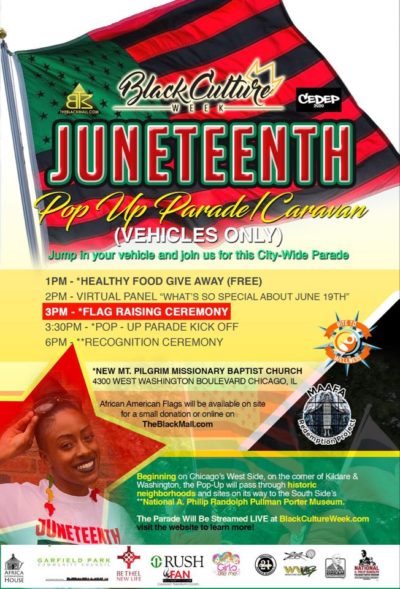Many celebrate independence by commemorating July 4, 1776, but enslaved Africans did not realize freedom until decades later. For African-Americans, June 19, 1865, represents the official end of slavery in the United States, and 2020 marks the 155th anniversary. On this day, known as Juneteenth, we reflect on the past and pay homage to the sacrifices our ancestors made for freedom. It also serves as a reminder that we are still fighting the same battles to this day. Even though most states within the U.S. recognize Juneteenth as a holiday or an official observance, it has yet to be declared an official federal holiday.
 To keep the tradition alive, David Peterson, President/Executive Director of the National A. Philip Randolph Pullman Porter Museum, is teaming up with The Black Mall for the eighth year in a row to commemorate Juneteenth. There is significance in holding the Juneteenth celebration at the historical museum located in Chicago’s first national park. During this time, the Buffalo Soldiers, who were the first national park rangers, are acknowledged for riding into Galveston, Texas, to announce that slavery was officially over. Peterson credits the mentorship of Baba Kwesi Ronald Harris for teaching him and others to appreciate their culture and for being the inspiration behind the development of the Juneteenth commemoration.
To keep the tradition alive, David Peterson, President/Executive Director of the National A. Philip Randolph Pullman Porter Museum, is teaming up with The Black Mall for the eighth year in a row to commemorate Juneteenth. There is significance in holding the Juneteenth celebration at the historical museum located in Chicago’s first national park. During this time, the Buffalo Soldiers, who were the first national park rangers, are acknowledged for riding into Galveston, Texas, to announce that slavery was officially over. Peterson credits the mentorship of Baba Kwesi Ronald Harris for teaching him and others to appreciate their culture and for being the inspiration behind the development of the Juneteenth commemoration.
In light of the pandemic, the usual festival will not take place. Still, instead, there will be a Juneteenth Holiday Citywide Caravan and other activities throughout the day on Friday, June 19, 2020. The caravan will kick off on the Westside at New Mount Pilgrim Missionary Baptist Church and then make its way toward several of Chicago’s historic sites and neighborhoods. The caravan will highlight contributions that African-Americans have made to specific landmarks in the city. Stops will include the DuSable Bridge on North Michigan Avenue, Motor Row in the South Loop, Bronzeville, and other locations. The caravan will end its journey at the National A. Philip Randolph Pullman Porter Museum on the southside with a spoken word concert. All events will stream live at www.BlackCultureWeek.com.
Peterson said that we should have the same pride and love for Independence Day as we do for the 4th of July. “We can use this as a teachable moment,” he stated. “After the riots, this is an opportunity to bring a constructive sense of pride to our communities and who we are, unapologetically. We are looking at this as a citywide processional to cleanse the energy of the city and welcome the presence of our ancestors.” He also mentioned that we must stop outsiders with ulterior motives from infiltrating our communities and hijacking our efforts.
When asked what he would like people to take away from this year’s Juneteenth activities, Peterson responded, “We need to be more intentional in honoring the struggles of our ancestors.“ Instead of being resistant and having the mindset that “we are not our ancestors,” young people should be respectful of the contributions and valuable lessons of previous generations and be willing to join the elders at the table. In addition, the demand for reparations for centuries of oppression against African-Americans is a long-standing issue that lawmakers can no longer ignore due to the recent surge of media attention. Peterson also pointed out that even though we are free from slavery, the 13th Amendment has allowed us to be legally forced into modern-day slavery if arrested. He would like to see issues such as these remain at the forefront of the conversation and said that it is more important now than ever for us to focus on moving forward.
You can view all Juneteenth activities live at www.BlackCultureWeek.com. The website also has details on activities for Black Culture Week taking place June 19 through June 28 and will involve virtual events. You can also go to www.nationalpullmanportermuseum.com or www.TheBlackMall.com to find information.
Donna Montgomery is a Community/Arts writer in Chicago. Find her on social media at @GoldenLadyWrites.
